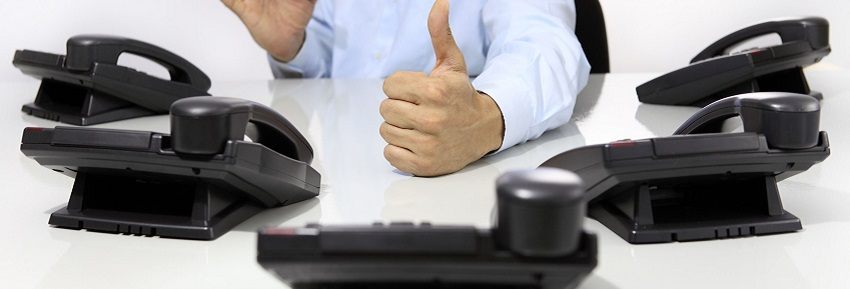
Compare Quotes & Save up to 40%!
Compare & Find the perfect Solution For You!
- Save time and money by letting us do the legwork for you
- We will look at the most suitable and competitive providers for you
- Our expert service is 100 % free with no-obligation
- Get the options to make an informed decision and get the best deal
Phone system: The different types of multi line phone systems
Multi line phone systems allow businesses to transfer any incoming call to the right contact within the company network - and also allow any telephone in the company network to reach any number. Also known as switchboard systems, these advanced hardware systems no longer need large physical boards to operate, nor do they really need switches. Let’s have a look at the three main types of systems, and at a few representative models to see what’s available on the market - and at what price.

Types of multi line phone systems
Switchboard systems can either be key telephone systems, PBX systems or hybrid systems.
Key telephone systems
Key telephone systems are the most traditional multi line phone systems. Users simply need to accept incoming calls or make outgoing calls by pressing the dedicated key on their telephone set. The problem with these key telephone systems is that they are not really part of a company network, as they do not allow an extension system to be used. Also, these systems lack any scalability, and quickly turn obsolete when technologies and the needs of users evolve.
This kind of basic system is therefore better suited for small companies.
PBX systems
These multi line phone systems have become extremely popular over the last forty years, so as to become the de facto standard. Because they represent a real, connected enterprise telephone system, they allow the use of extension numbers and other communication devices like fax machines. They can also be used in more than one physical location, and are therefore recommended for large companies working across multiple sites. One basic PBX system can be extended at will to cater for the evolving needs of growing businesses.
Hybrid telephone systems
These systems are very similar to PBX systems, but rely on the internet to transmit some voice communications. They are therefore called “hybrid” because long distance calls will be transmitted over VoIP, while local calls will go through the traditional phone system. This allows for substantial savings on telecommunications costs, and call quality is becoming less and less of a concern.
These multi line systems have become increasingly popular, even with small companies.
Hardware packages
Multi line phone systems are produced by a large number of manufacturers. The simplicity and small size of modern systems allow them to be sold in all-inclusive, ready-to-use packages. The Panasonic KX-TES 824, Orchid PBX 308+ and BT Versatility telephone systems are typical examples of what’s available on the market.
Panasonic KX-TES 824 multi line phone systems
These multi line phone systems from Panasonic have been designed for small and medium sized companies. They can accept up to 8 exchange lines and 24 extensions.
Pricing starts slightly over £300, excluding VAT.
Orchid PBX 308+
This system, made chiefly for small businesses, comes in a 4-phone, 3-extension line, 8-user extension package, including all necessary cables and connectors. The usual essential features are supported, but also more advanced ones like flexible ring assignment, power failure transfer and programmable call restrictions.
VAT-exclusive price stays below £300.
BT Versatility telephone system
This system distributed and branded by BT can be set up as a hybrid VoIP system allowing it to be used with VoIP phones. Some features were specifically designed for the hospitality industry.
Prices start at £625 excluding VAT.





